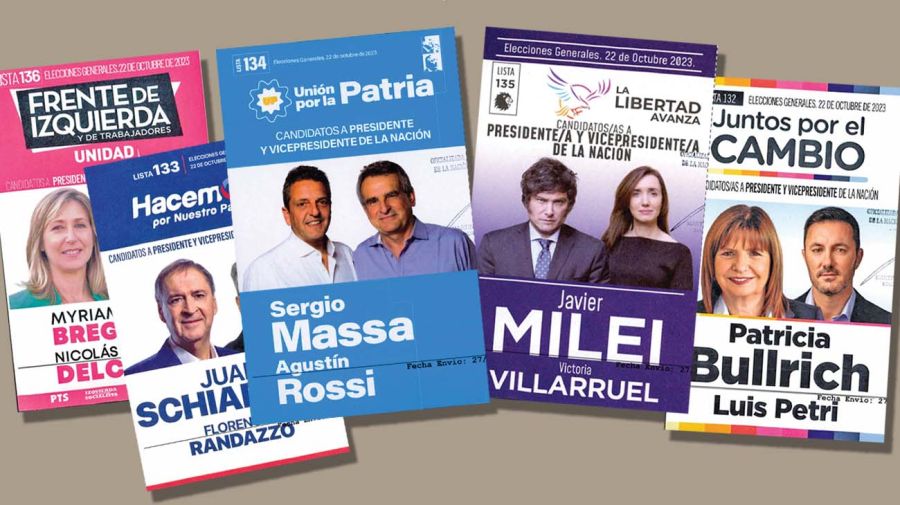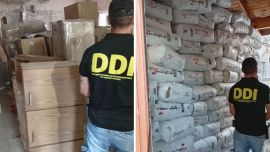On August 13, 2023, Argentina’s voters decided on the presidential candidates for the general election and delivered a political bombshell: in an outcome nobody foresaw, libertarian lawmaker Javier Milei emerged in first place with almost 30 percent of all votes cast.
The results of the PASO primaries shook the political landscape and instantly installed the outspoken 52-year-old economist as the frontrunner. Running in competitive primaries, ruling coalition candidate Sergio Massa and opposition leader Patricia Bullrich won their electoral battles (the former taking 21 percent to his rival’s six percent; the latter taking 17 percent compared to 11 percent) but both now face an even bigger challenge if they are to take Milei to a second-round run-off scheduled for November 19.
Juan Schiaretti of Hacemos por Nuestro País, with almost four percent of the vote, and Myriam Bregman of the Frente de Izquierda y de Trabajadores-Unidad, with just over 2.5 percent of the vote, also qualified for the election proper.
Whoever wins the race for the Casa Rosada will take office on December 10 in a year marking the 40th anniversary of the return of democracy to Argentina after the fall of the military dictatorship which ruled Argentina from 1976 to 1983.
Tomorrow, citizens across the country go to the polls tomorrow for a crunch election.
Here are the five candidates in the running to become the nation’s next head of state:
Javier Milei
Complete name: Javier Gerardo Milei
Date of birth: 22/10/1970
Place of birth: City of Buenos Aires
Profession: Economist (Universidad de Belgrano graduate)
Political affiliation: Partido Libertario
Current public office: National deputy
Previous public offices held: None
Coalition/front: La Libertad Avanza
Javier Milei, of the La Libertad Avanza, who turns 53 tomorrow, is an economist and the candidate with the least experience in public life, which he entered in 2021 as a national deputy on the back of 17 percent of the midterm voting in Buenos Aires City
His discourse is to question what he calls "the caste" or the local political establishment, insisting on drastic state spending cuts, including public employment. His proposals include dollarisation and closure of the Central Bank, as well as privatising public enterprise, tax cuts and labour reforms to reduce employer costs.
While his economic focus is libertarian, his social proposals are conservative. For example, his party opposes legalised abortion and does not think that integral sex education should be obligatory in schools. He also proposes deregulating arms possession.
In his professional career, Milei worked with an AFJP (Administradora de Fondos de Jubilaciones y Pensiones) private pension fund until they ceased to exist when the system returned to the state in 2008. He then started working as an economic consultant for Corporación America billionaire Eduardo Eurnekián, who has interests in the sectors of energy, airports, infrastructure and agro-industry.
Before entering Congress, Milei was already a public figure with his persistent appearances in television programmes with high ratings, where he expressed his criticisms of economic management and other public affairs in highly histrionic fashion.
His running-mate is fellow-deputy Victoria Villarruel, a highly controversial figure for human rights circles for her alleged denialism of state terror during the 1976-1983 military dictatorship.
Sergio Massa
Complete name: Sergio Tomás Massa
Date of birth: 28/04/1972
Place of birth: San Martín, Buenos Aires Province
Profession: lawyer
Political affiliation: Frente Renovador
Current public office: Economy minister
Previous public offices: national deputy, Tigre mayor, director of ANSES social security administration, Cabinet chief
Coalition/front: Unión por la Patria
Lawyer Sergio Massa, 51, has been Economy minister since August, 2022. Prior to that he was speaker of the lower house of Congress. He has been married to Malena Galmarini (who currently heads the AySA waterworks) since 2001 and they have two children.
Massa is one of the three main partners of the Peronist coalition which came to power in 2019 under the name of Frente de Todos and is now rebranded as Unión por la Patria. The other two are President Alberto Fernández and Vice-President Cristina Fernández de Kirchner, the latter a two-term former president and until recently the most powerful of the trio in political terms. If Fernández de Kirchner represents the left within Peronism, Massa is more to the centre. He has good links with diverse political, business and trade union sectors, as well as contacts abroad.
Massa has a long political career stretching back over 30 years when he joined the Unión de Centro Democrático liberal party. This brought him close to Carlos Menem, the Peronist president carrying out neoliberal policies in the last decade of the century, becoming Social Development secretary during his government.
Elected a Peronist deputy for Buenos Aires Province in 1999, he joined the government of Eduardo Duhalde after the 2001 crisis. Placed in charge of ANSES (Administración Nacional de la Seguridad Social) social security administration managing the pension system, he remained in that post after Néstor Kirchner was elected president in 2003.
In 2007, Massa was elected to his first executive post: mayor of the northern Greater Buenos Aires district of Tigre but quickly moved on to become the Cabinet chief of Cristina Fernández de Kirchner between mid-2008 and mid-2009, replacing current President Alberto Fernández.
Distanced from Fernández de Kirchner in her second term, Massa formed his own party, the Frente Renovador, in 2013, trouncing the government in that year’s midterms. This encouraged him to run for the Presidency in 2015 but he finished third behind the Kirchnerite candidate Daniel Scioli in elections won by Mauricio Macri.
Neither was his luck any better running for senator in the 2017 midterms. He redeveloped ties with Fernández de Kirchner, joining Frente de Todos in time for the 2019 elections won by Alberto Fernández.
His admirers consider him a pragmatist who can dialogue with representatives of the most diverse sectors, taking on the challenge of commanding the Economy Ministry at a highly complex time with pessimistic perspectives.
But his critics run him down as somebody less than trustworthy who changes his stances and allies too easily. One of the doubts surrounding his presidential bid is whether, in the event of a triumph, he would be able to amalgamate a divided Peronism, especially after the Alberto Fernández experience.
On the other side of the fence to Milei, Unión por la Patria proposes a stronger state. According to its electoral platform, its government would focus on the recovery of the domestic market and looking after the most vulnerable sectors, also calling for a broad national agreement with other political parties and social sectors. Unlike La Libertad Avanza, the ruling coalition is socially progressive, defending human and sexual rights such as legal abortion.
Massa’s running-mate is Agustín Rossi, the current Cabinet chief.

Patricia Bullrich
Complete name: Patricia Bullrich Luro Pueyrredón
Date of birth: 11/06/1956
Place of birth: City of Buenos Aires (CABA)
Profession: political scientist (UNSAM)
Political affiliation: PRO
Current public office: none
Previous public offices: Security minister, Labour minister and national deputy
Coalition/front: Juntos por el Cambio
Patricia Bullrich, 67, is a political scientist who served as Argentina’s security minister throughout the Mauricio Macri Presidency (2015-2019). She previously served as a national deputy and had prior Cabinet experience as Labour minister in the Alianza coalition government of the Radical Fernando De la Rúa, who had to leave the Casa Rosada in a helicopter during the 2001 economic and social crisis.
Today Bullrich is the chair on leave of the Propuesta Republicana (PRO) party founded by ex-president Mauricio Macri, one of the three main partners of Juntos por el Cambio alongside the Unión Cívica Radical and the Coalición Cívica.
The electoral platform of Juntos por el Cambio calls for the "rebuilding" of the country, including an economic stabilisation plan to halt an annual inflation rate now running above 115 percent.
Like Milei, Bullrich proposes cutting public spending and taxes. She further assures that she will rapidly unify the different exchange rates for the dollar which distort the economy. She further proposes deregulation of the private sector with the objective of creating more jobs.
The hard-liner is seen as the most right-wing member of her coalition, particularly when it comes to crime-fighting. Her voters consider her a firm hand who will restore order and slash what they view as excessive state spending.
She has a certain overlap with Massa though in that her critics see her as passing through various positions which seem difficult to reconcile. Bullrich began her political activity in her teens as a Peronist Youth militant but denies ever having formed part of the Montoneros guerrilla organisation even though some press investigations – and Milei – assure the contrary.
Her running-mate is Luis Petri, a former Radical deputy from Mendoza.
Juan Schiaretti
Complete name: Juan Schiaretti
Date of birth: 19/06/1949
Place of birth: Córdoba
Profession: chartered accountant (Universidad Nacional de Córdoba)
Political affiliation: Partido Justicialista de Córdoba / Hacemos Unidos por Córdoba
Current public office: governor of Córdoba
Previous public offices: lieutenant-governor of Córdoba and Industry secretary in the national government
Coalition/front: Hacemos por Nuestro País
Governor of Córdoba Province since 2015, Juan Schiaretti heads the non-Kirchnerite Peronist electoral option, defending federalism in Argentina.
Schiaretti, 74, unchallenged within his front, congratulated Milei on his PASO (Primarias, Abiertas, Simultáneas y Obligatorias) primary victory also in Córdoba but nevertheless differs from the more theoretical libertarian in presenting more concrete proposals: "A plan of macro-economic stabilisation based on zero fiscal deficit with no savage austerity needed."
Wanting a “normal country" is another of his mottos.
The veteran politician also proposes weeding out the overlap of state tasks between the national, provincial and municipal levels of government while eliminating or reducing energy subsidies and the deficit of state companies. He defends the institutions, public education and human rights.
As a teenager, Schiaretti embraced the ideology of left-wing Peronism and was one of the leaders of the Justicialist Party during the "Cordobazo." After graduating as a public accountant from the National University of Córdoba (UNC), he was threatened by the Triple A in 1975, so he moved to Neuquén, and later, with the military coup of 1976, he went into exile in Brazil. On his return from exile, and after having worked in the private sector, he became involved with the Fundación Mediterránea, whose leader at the time was the former Economy Minister Domingo Cavallo, whom he already joined in the Menem government when Cavallo was Foreign minister (1989-1991).
In 1993 he was elected as a national deputy for Córdoba but within days he was named federal trustee in Santiago del Estero, where he stayed until 1995. In 1999, then Córdoba Governor José Manuel de la Sota made him his provincial production minister where he remained until returning to Congress in 2001. In 2003 he was De la Sota’s running-mate, succeeding him as governor in 2007 and returning to that post in 2015 where he is now completing his third term.
His running-mate is dissident Peronist Florencio Randazzo.
Myriam Bregman
Complete name: Myriam Teresa Bregman
Date of birth: 25/02/1972
Place of birth: Timote, Buenos Aires Province
Profesión: lawyer
Political affiliation: Partido de los Trabajadores Socialistas (PTS) within the Frente de Izquierda y de Trabajadores-Unidad (FIT)
Current public office: national deputy
Previous public offices: City legislator and national deputy
Front/coalition: FIT – Unidad
A fan of Estudiantes de La Plata, Bregman is the national leader of the Trotskyist Partido de los Trabajadores Socialistas (PTS).
Born in Timote, a tiny hinterland township in Buenos Aires province, the 51-year-old graduated in law from the University of Buenos Aires (UBA) in the 1990s when she started her PTS militancy.
She was one of the lawyers of Jorge Julio López, who went missing in 2006 after testifying against the convicted genocide Miguel Osvaldo Etchecolaz. She was a co-founder of the Centro de Profesionales por los Derechos Humanos, participating as a defence lawyer in cases of police brutality and trigger-happy shootings.by the Buenos Aires provincial force.
Leader of the feminist grouping Pan y Rosas defending women’s rights, she has long advocated the right to legal and voluntary abortion. One of the slogans of her party is never to submit to the International Monetary Fund or any form of austerity.
Bregman has been in national politics for over 12 years, currently sitting for the City of Buenos Aires but with previous Congress experience representing Buenos Aires Province for a year from 2015 until the end of 2016, when her place was taken by Juan Carlos Giordano of Izquierda Socialista as part of an agreement for rotating seats. Between 2017 and 2021 she was a City legislator.
Her running-mate is former presidential candidate, national deputy Nicolás Del Caño.






















Comments